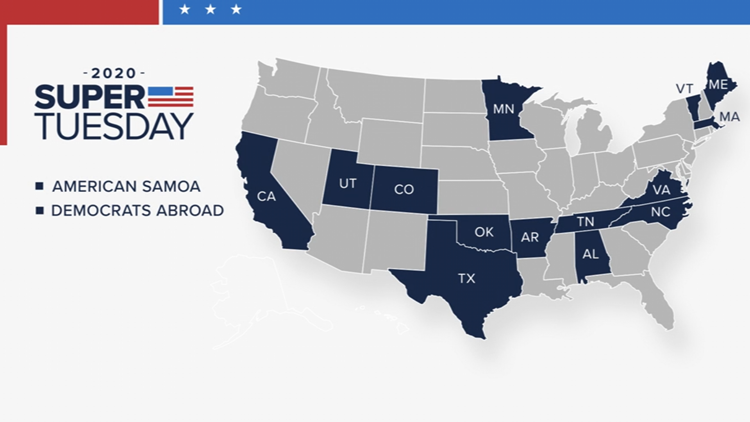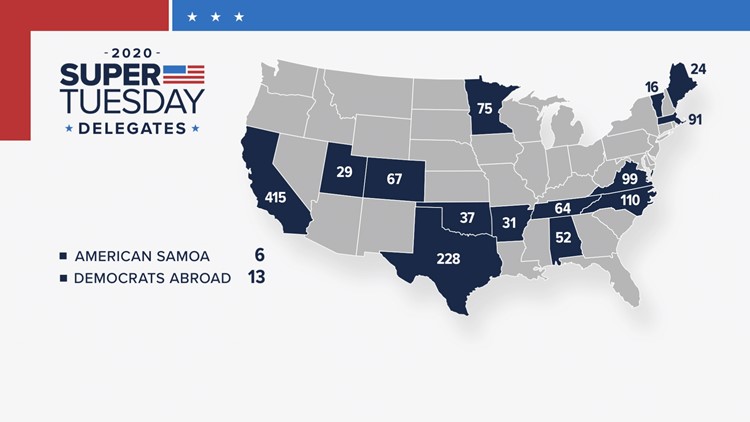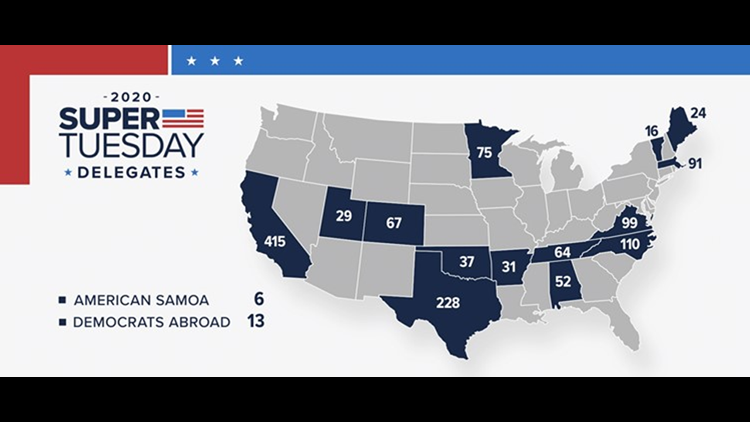WASHINGTON, DC (TEGNA) — Super Tuesday is the closest thing to a national primary our country has throughout the race for the White House. It's the day when the most states hold an election and it's when the largest chunk of delegates are allotted to candidates.
With a crowded field for the Democratic presidential nomination, Super Tuesday could greatly impact the race to face President Donald Trump.
Most of the attention is on the Democrats' race, although the president is still facing a long-shot primary challenge from former Massachusetts Governor Bill Weld.
So, here's what you need to know.
When is Super Tuesday?
March 3, 2020. It's the first big primary day after the four early nominating states, Iowa, New Hampshire, Nevada and South Carolina.
Which states vote on Super Tuesday?
Fourteen states will participate from across the country including: Alabama, Arkansas, California, Colorado, Maine, Massachusetts, Minnesota, North Carolina, Oklahoma, Tennessee, Texas, Utah, Vermont and Virginia.

How many delegates are up for grabs?
During Super Tuesday, 34 percent or 1,357 delegates will be up for grabs on March 3.
In total, there's 3,979 delegates. Before Super Tuesday only 155 delegates were allotted. After the big voting day, 2,467 delegates will still be available. The primary process lasts until the Democratic national convention which will be held in Milwaukee, Wisconsin in July.
Here's the breakdown of the number of delegates per state on Super Tuesday:
- Alabama: 52
- Arkansas: 31
- California: 415
- Colorado: 67
- Maine: 24
- Massachusetts: 91
- Minnesota: 75
- North Carolina: 110
- Oklahoma: 37
- Tennessee: 64
- Texas: 288
- Utah: 29
- Vermont: 16
- Virginia: 99

In order to win on the first ballot at the convention, a Democratic candidate would need 1,991 delegates. With so many candidates still left in the race, there's a chance no one will have enough delegates to win on that first ballot. If that happens, there would be a second ballot where superdelegates would get a say as to who should be the nominee.
Why is Super Tuesday so important?
With more than a third of the delegates up for grabs on a single day, it could bring clarity to who might be leading in the Democratic race. This is also the first time former New York City Mayor Michael Bloomberg will appear on the ballot.
As of March 3, Sen. Bernie Sanders has the most delegates with 60, former Vice President Joe Biden is in second with 54 and Sen. Elizabeth Warren has eight.
Former South Bend, Ind. mayor Pete Buttigieg, who had 26, and Sen. Amy Klobuchar, who had 7, have both dropped out of the race.
RELATED: VERIFY: Superdelegates and how Democrats pick their presidential nominee
Who is still running?
There's still a pretty long list of contenders to be the Democratic nominee. Here's the current list of individuals still running, as of March 3:
- Former Vice President Joe Biden
- Former mayor of New York City Mike Bloomberg
- Congresswoman from Hawaii Tulsi Gabbard
- Senator from Vermont Bernie Sanders
- Senator from Massachusetts Elizabeth Warren
When will Super Tuesday's results be announced?
The polls in each state will close at different times, especially since states across the country are involved. However, all of the results will likely not be known on Tuesday -- especially on the West Coast. California's results might take several days to be finalized since mail-in ballots with postmarks on election day are accepted.
Here's when polls close by state:
- Alabama: 7 p.m. CST
- Arkansas: 7:30 p.m. CST
- California: 8 p.m. PST
- Colorado: 7 p.m. MST
- Massachusetts: 8 p.m. EST
- Maine: 8 p.m. EST
- Minnesota: 8 p.m. CST
- North Carolina: 7:30 p.m. EST
- Oklahoma: 7 p.m. CST
- Tennessee: 8 p.m. EST/7 p.m. CST (State is split between two time zones)
- Texas: 7 p.m. CST
- Utah: 8 p.m. MST
- Virginia: 7 p.m. EST
- Vermont: 7 p.m. EST



